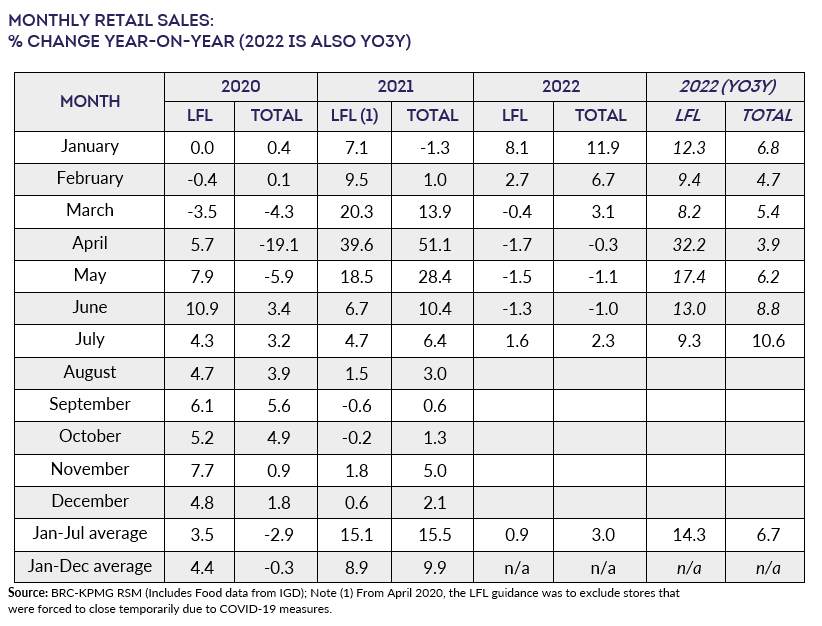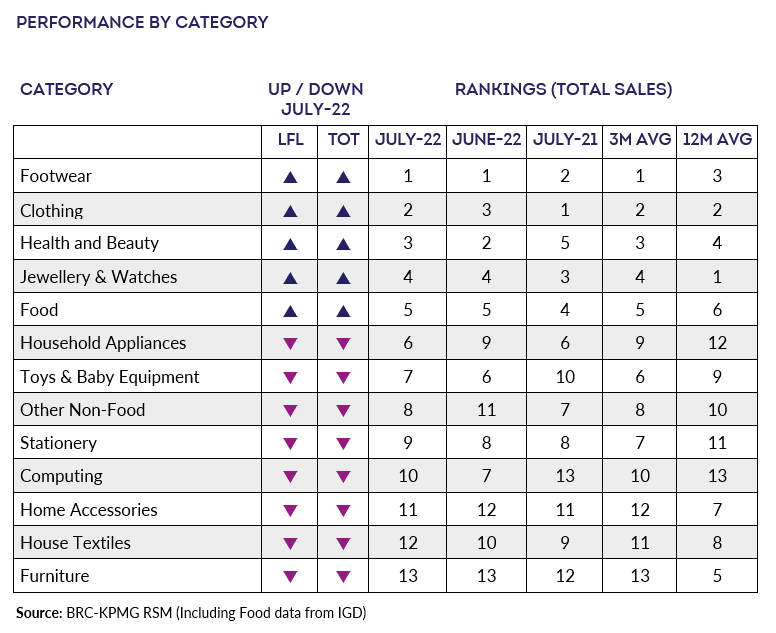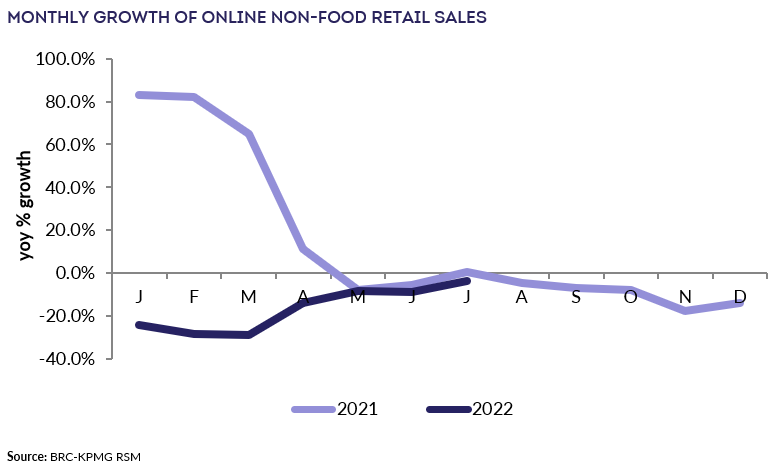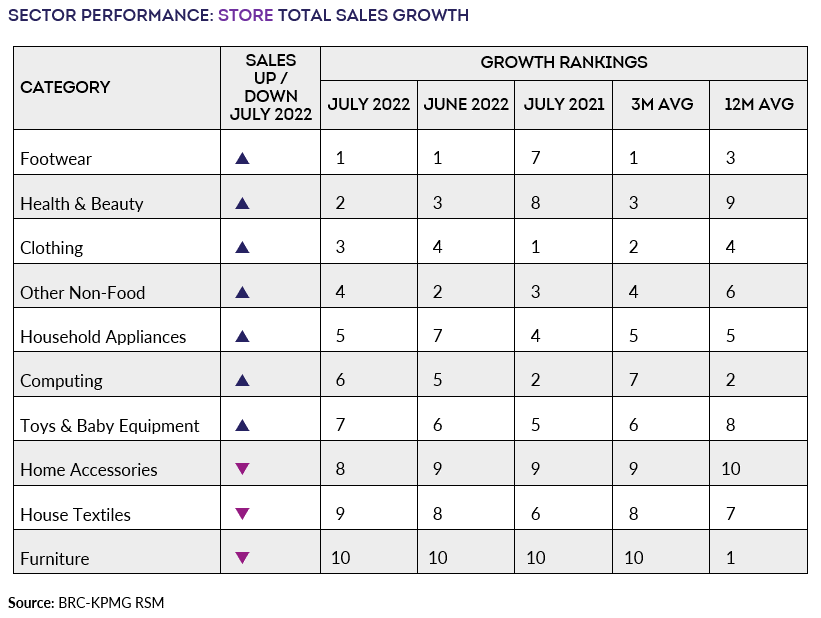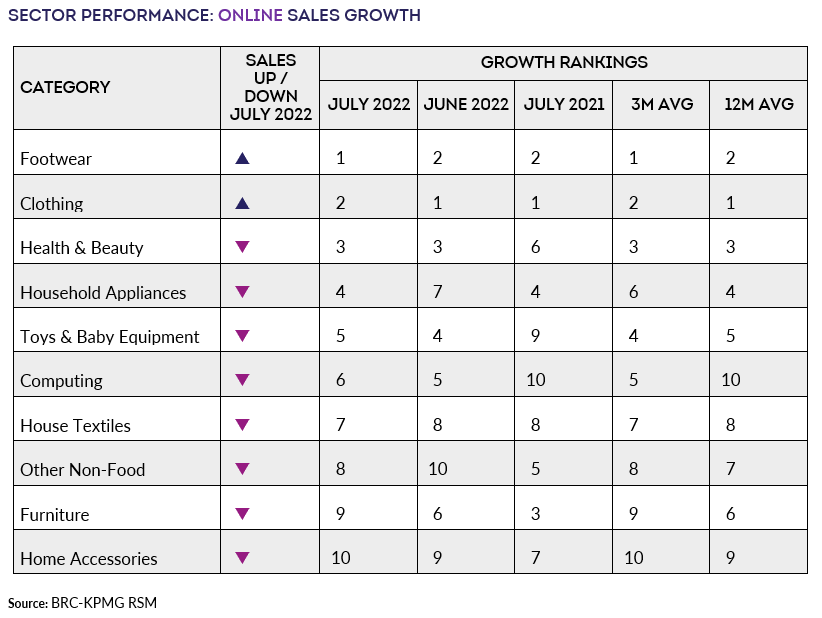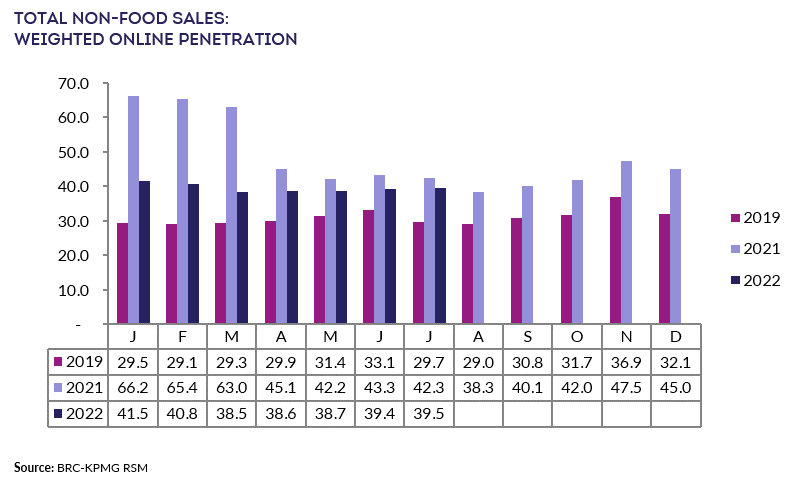Sales figures are not adjusted for inflation. Given that both the
July SPI (BRC) and June CPI (ONS) show inflation running at
historically high levels, the small rise in sales masked a much
larger drop in volumes once inflation is accounted for.
Covering the four weeks 3 - 30 July
2022
- On a Total basis, sales increased by 2.3% in July, against an
increase of 6.4% in July 2021. This is below the 3-month average
of 0.0% and the 12-month average growth of 2.7%.
- UK retail sales increased 1.6% on a Like-for-like basis from
July 2021, when they had increased 4.7%. This was above the
3-month average decline of 0.5% and below the 12-month average
growth of 0.8%.
- Over the three months to July, Food sales increased 2.3% on a
Total basis and 1.8% on a Like-for-like basis. This is above the
12-month Total average growth of 0.6%. For the month of July,
Food was in growth year-on-year.
- Over the three-months to July, Non-Food retail sales
decreased by 2.0% on a Total basis and 2.5% on a like-for-like
basis. This is below the 12-month Total average growth of 4.5%.
For the month of July, Non-Food was in growth year-on-year.
- Over the three months to July, In-Store sales of Non-Food
items increased 2.0% on a Total basis and 1.2% on a Like-for-like
basis since July 2021. This is below the 12-month growth of
34.4%.
- Online Non-Food sales decreased by 3.9% in July, against a
decline of 0.6% in July 2021. This is above the 3-month average
decline of 7.3% and the 12-month decline of 14.1%.
- The Non-Food Online penetration rate decreased to 39.5% in
July from 42.3% at the same point last year.
Helen Dickinson OBE, Chief Executive | British Retail
Consortium
“Sales improved in July as the heatwave boosted sales of hot
weather essentials. Summer clothing, picnic treats, and electric
fans all benefitted from the record temperatures as consumers
made the most of the sunshine. However, with inflation at over 9%
many retailers are still contending with falling sales volumes
during what remains an incredibly difficult trading period.
“Consumer confidence remains weak, and the rise in interest rates
coupled with talk of recession will do little to improve the
situation. The Bank of England now expects inflation to reach
over 13% in October when energy bills rise again, further
tightening the screws on struggling households. This means that
both consumers and retailers are in for a rocky road throughout
the rest of 2022.”
, UK Head of Retail at
KPMG | KPMG
“The sun came out for retailers in July, as like for like sales
grew 1.6% on last year. Against a backdrop of the cost of
living crisis and on-going reports of low consumer confidence
actual sales are still holding up. Online retailers also
saw the benefit of warmer weather with sales growth falling more
slowly, by just 3.9% on July 2021.
“Despite consumer polls suggesting confidence is at an all-time
low, this hasn’t translated to money not being spent at the
tills, as consumers are determined to enjoy delayed holidays and
an unrestricted summer. Pent up demand, especially for new
clothes, has so far been at significant enough levels to keep the
overall retail sector in relatively good health. With
travel and summer socialising back on the agenda, retailers will
be hoping the feel good factor continues into August.
“However, the summer could be the lull before the storm with
conditions set to get tougher as consumers arrive back from
summer breaks to holiday credit card bills, another energy price
hike and rising interest rates. With stronger cost of
living headwinds on the horizon, consumers will have to
prioritise essentials, and discretionary product spending will
come under pressure. As margins continue to be challenged, and
costs continuing to rise, a significant drop in demand come the
Autumn will have detrimental impact on the health of the retail
sector. Truly understanding individual customer buying patterns
and being able to differentiate these will become increasingly
more important for the sector.”
Food & Drink sector performance | Susan Barratt, CEO
| IGD
“July’s food and drink value sales were again flattered by
inflation, masking some ongoing dips in sales volumes. Shoppers
are genuinely tightening their belts by buying fewer items in
addition to switching stores and buying more private label
products.
“Our Shopper Confidence Index improved a little in July, no doubt
boosted by England’s Lionesses successful Euro 2022 football
campaign. Plus, the heatwave and one in four families receiving
the first cost of living payment, fewer were impacted by rising
energy bills (68% compared to 74% in April ’22). However, with
food price inflation forecast to increase in the coming months
and Ofgem expected to announce a significant increase in the
energy price cap at the end of August, there are still
significant challenges ahead.”
